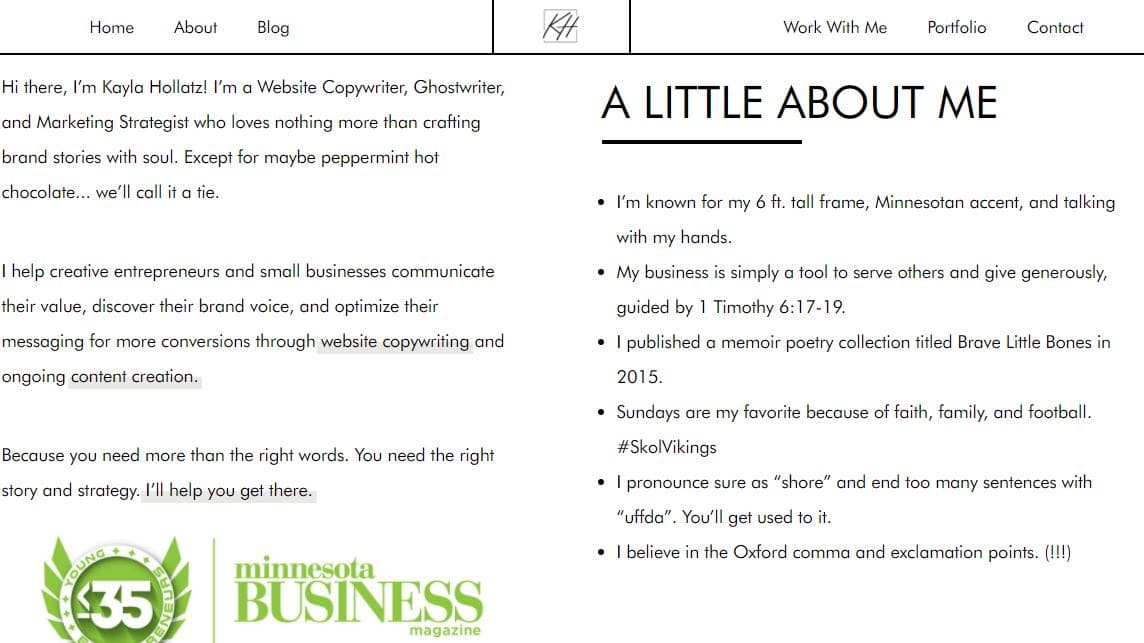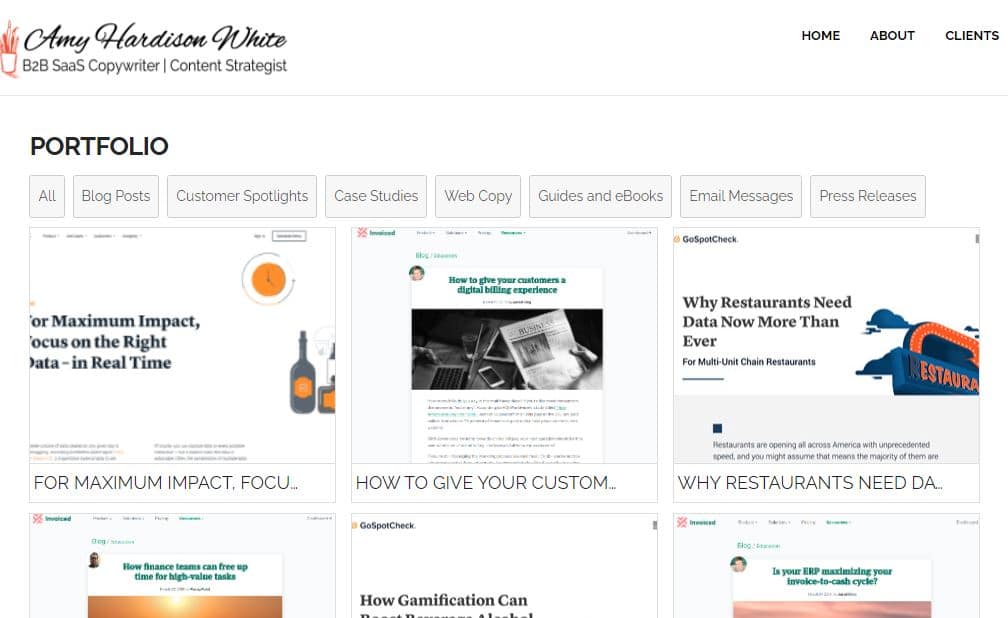What’s the secret to creating a freelance writing website that get’s noticed?
You know…an ideal client lands on your writer website. And you’ve got all the right stuff there to get that person to call, email, or connect to talk about freelance work.
As a freelance writer, a great site can:
- Generate freelance writing leads
- Grow your network
- Show off your portfolio
- Help you stand out as the writer in your niche
…while you sleep.
Chances are pretty good you already know a good website helps pro freelance writers stand out.
But what does your writer website look like?
Maybe you keep putting it off or avoid giving it an upgrade because you’re not a graphic designer, web developer or tech genius.
Sound familiar?
If you aren’t sure where to start or how to improve your online presence, you’re in luck.
Here are 5 essentials to get your freelance writing website up and running to stand out, move up, and earn more

1. Identify your freelance writing niche
When you decide to throw up a writer website, one of the biggest mistakes new freelancers make is trying to serve every type of client in every industry.
FYI…It doesn’t work very well. Why? Because people generally don’t search for generic solutions to specific problems.
Prospects are going to search for a freelance writer with specific experience in their niche or industry like this:
- [Niche] freelance writer
- finance freelance writer
- healthcare freelance writer
- fitness freelance writer
- engineering freelance writer
- technology freelance writer
- start-up freelance writer
- SaaS freelance writer
If you’re ready to build your writer website (or you got started with the generic approach), now is a good time to define your niche or niches (focus on just a couple).
Once you identify your niche, it makes building your writer website and marketing yourself as a freelance writer a lot easier.
Here’s an example: Freelance writer Mandy Ellis stands out to potential clients by niche AND location (but she can still write for clients outside Austin and in different niches).

Tip: Define your freelance writing niches and ideal clients. And take a look at other top-ranking freelancer sites in your niche to get ideas.
Once you have some ideas in place for your write website, then what?
2. Choose a domain name + web hosting for your freelance site
In order to get a freelance writing website up and running, you first need to have a domain name and web hosting.
Domain name
It’s what you call your writer website.
If YourName.com is available, I’d recommend going with that. You can find out if it’s available here, or check with your web hosting company (more on that in a just a bit).
If YourName.com isn’t available, there’s lots of other naming conventions you can use to choose your domain name, like this:

Tip: Remember, there are already millions of websites online, so the domain name you want for your writer website might not be available. Keep trying until you find one that you like.
Web hosting
It’s the service provider with all the software and tech tools needed for your writer website to be seen on the Internet.
And there’s lots of them to choose from like Bluehost or GreenGeeks.


Tip: Not all web hosting companies are created equal.
Try finding a web hosting provider with…
- All the tools you need to build a great writer website (templates, blog, landing pages, SEO, plug-ins, drag-and-drop editing, portfolio features, etc)
- Excellent customer service
With the domain name and web host in place, you can now move on.
3. Build your freelance site with WordPress
What software should you use to build your writer website?
There are several different CMS (content management systems) you can use to build and design your writer website, like:
My software recommendation to build your writer website…WordPress.

There’s a couple of important reasons WordPress gets my stamp of approval for building your freelance writer website:
- It’s very easy to use, especially for beginners.
- All sorts of templates, plug-ins, tutorials and documents are available to help build your writer website with WordPress.
- If you need help with the technical part of setting up your write website, WordPress is the most widely-used software for web design. So you won’t have a problem finding an affordable designer or tech-savvy person to help you.
- Blogging. Every WordPress theme (more on this in just a sec) has a built-in blog feature ready to roll that you can use to create reader-friendly content. Blogging can be a great way to get traffic to your site and attract potential freelance writing clients in your niche.
What’s a WordPress theme?
It’s basically a template you can use to create your writer website. And there’s thousands of them.
Here are a couple of themes and plugins that work well to easily set up your freelance site:
Tip: It does not need to take days, weeks, or years to create your writer website. You can build a functional writer website in just a few hours. So set aside a block of time one day and get it done. Then keep it updated.
4. Create content for your freelance site
You’ve got your domain name, web hosting, and basic design elements figured out. Now it’s time to create content for your writer website.
This is where a lot of freelance writers get stuck.
Here’s the thing. Your writer website doesn’t have to be perfect. It’s going to change. A basic writer website is better than no website.
Imperfect action is always better than no action.
What should your writer website include?
Start with your homepage. Write the content, include a professional photo of yourself, and publish it. Remember, you can add more pages later.
Common pages for your freelance site may include:
Home
This is where you make first impressions, define your niche, deliver your elevator speech, and get prospects interested in working with you.
Check out the home page for freelance B2B and SaaS copywriter Michal Eisikowitz

About
It’s not just all business or a resume-style list of your work experience…Boring!
Clients like to know you’re a real person with likes, interests, hobbies, and other accomplishments. Your About page is a great place to get prospects to know, like and trust you.
Show off your personality on your About page like freelancer Kayla Hollatz (check out those fun facts!).

Portfolio
Show off your best work. Prospects always ask for examples, right?
Make it easy for them to see what you’ve done. (Don’t forget to update your portfolio when you complete a new project.)
Here’s how freelance writer Amy Hardison White set up her portfolio page.

Services
What type of writing services do you offer?
Your niche + the type of writing services you offer (blog posts, case studies, white paper writing, Facebook ads, etc.) is another way to stand out.
Here’s how freelance writer Kristi Hines does it.

Blog
Running a niche blog on your writer website like freelancer Jamie Johnson can be a great way to build authority in your niche and attract potential freelance clients. She even wrote about it: How to Get Freelance Writing Leads From Your Personal Blog
Contact
Your contact info may include your email address, phone number, contact form, social media channels, etc.
Make it easy for potential freelance clients to contact you like Laura MacPherson.

Testimonials
Show don’t tell. Including testimonials on your writer website helps build trust and authority when prospects check out your site.
Here’s how freelancer Gary Schenkel does it.

Other pages to consider
You may also want to include a list of clients you’ve worked with, frequently asked questions, or sales pages to purchase books or courses.
5. Leverage online marketing to drive traffic to your writer website
You’ve got your freelance writer website set up. Now what?
Solid marketing techniques will help you land more freelance clients and get extra traffic to your website.
Here are some marketing techniques to get more clients to your writer website:
- Share links to your site on social media. Start with LinkedIn. It’s where you’re most likely to find freelance writing clients. Share a link to your site, recent blog post, or testimonial published on your site. Using other social media networks like Twitter, Facebook, and even Instagram, can help drive traffic to your site.
- Optimize your site for SEO (search engine optimization). Proper SEO for a writer website can’t be overstated. If you have your SEO setup properly, then your site is going to get indexed and ranked faster and higher. This is a great way to get noticed organically in search results and an ongoing way to market your writer website.
- Build an e-mail list: Another great way to market your writer website is to build an email list. With a list of subscribers, you can promote your freelance writing services, share useful information, provide value, and stay connected to turn prospects into clients.
Build a writer website to attract more freelance clients
Building a freelance writing website to attract clients doesn’t have to be a difficult task. If you have the right tools and knowledge, you can literally get it done in a day for very little money.
It’s a critical part of marketing yourself as a freelance writer to get found online, connect with prospects, and make a living writing.



